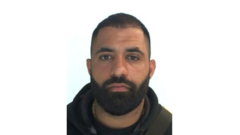Vanuatu's government is scrutinizing the citizenship of controversial influencer Andrew Tate following his acquisition of a golden passport amidst significant criminal allegations. The Vanuatu Passport Program allows individuals to gain citizenship through a minimum investment of $130,000. However, concerns about the misuse of such programs have sparked a crackdown, especially after Tate's arrest in Romania on charges of rape and human trafficking. The government has expressed its intent to prevent individuals with questionable backgrounds from obtaining citizenship, particularly those sought by law enforcement.
**Vanuatu Considers Repealing Andrew Tate's Citizenship Amid Criminal Allegations**

**Vanuatu Considers Repealing Andrew Tate's Citizenship Amid Criminal Allegations**
Authorities in Vanuatu are reviewing the possibility of revoking Andrew Tate's golden passport, which he obtained shortly before his arrest for serious criminal offenses.
The scrutiny arises from Tate's citizenship acquisition in December 2022, coinciding with his arrest and subsequent legal challenges in Romania. Despite Vanuatu’s economic reliance on citizenship-by-investment programs, officials are wary of the implications of granting citizenship to individuals embroiled in serious criminal investigations.
In the wake of various controversies surrounding the Sale of Passports framework, Vanuatu's authorities stated, “The government does not want to encourage people of questionable backgrounds to be granted citizenship.” The pushback from the European Union and other international bodies over such schemes has only intensified the need for a comprehensive review of who qualifies for these fast-tracked opportunities.
Having gathered millions of followers online, Tate has attracted attention not only for his lifestyle, which showcases luxury living, but also for his openly misogynistic views, making him a polarizing figure globally. Currently, the UK is pursuing his and his brother Tristan's extradition to address charges stemming from allegations dating back to 2012.
With Vanuatu lacking a formal extradition treaty with Romania, the fate of Tate's citizenship remains uncertain as legal proceedings unfold, raising questions about the implications of such rapid citizenship grants moving forward.
In the wake of various controversies surrounding the Sale of Passports framework, Vanuatu's authorities stated, “The government does not want to encourage people of questionable backgrounds to be granted citizenship.” The pushback from the European Union and other international bodies over such schemes has only intensified the need for a comprehensive review of who qualifies for these fast-tracked opportunities.
Having gathered millions of followers online, Tate has attracted attention not only for his lifestyle, which showcases luxury living, but also for his openly misogynistic views, making him a polarizing figure globally. Currently, the UK is pursuing his and his brother Tristan's extradition to address charges stemming from allegations dating back to 2012.
With Vanuatu lacking a formal extradition treaty with Romania, the fate of Tate's citizenship remains uncertain as legal proceedings unfold, raising questions about the implications of such rapid citizenship grants moving forward.





















